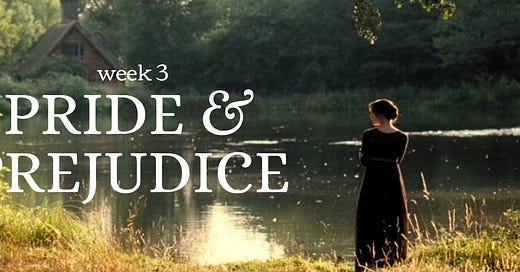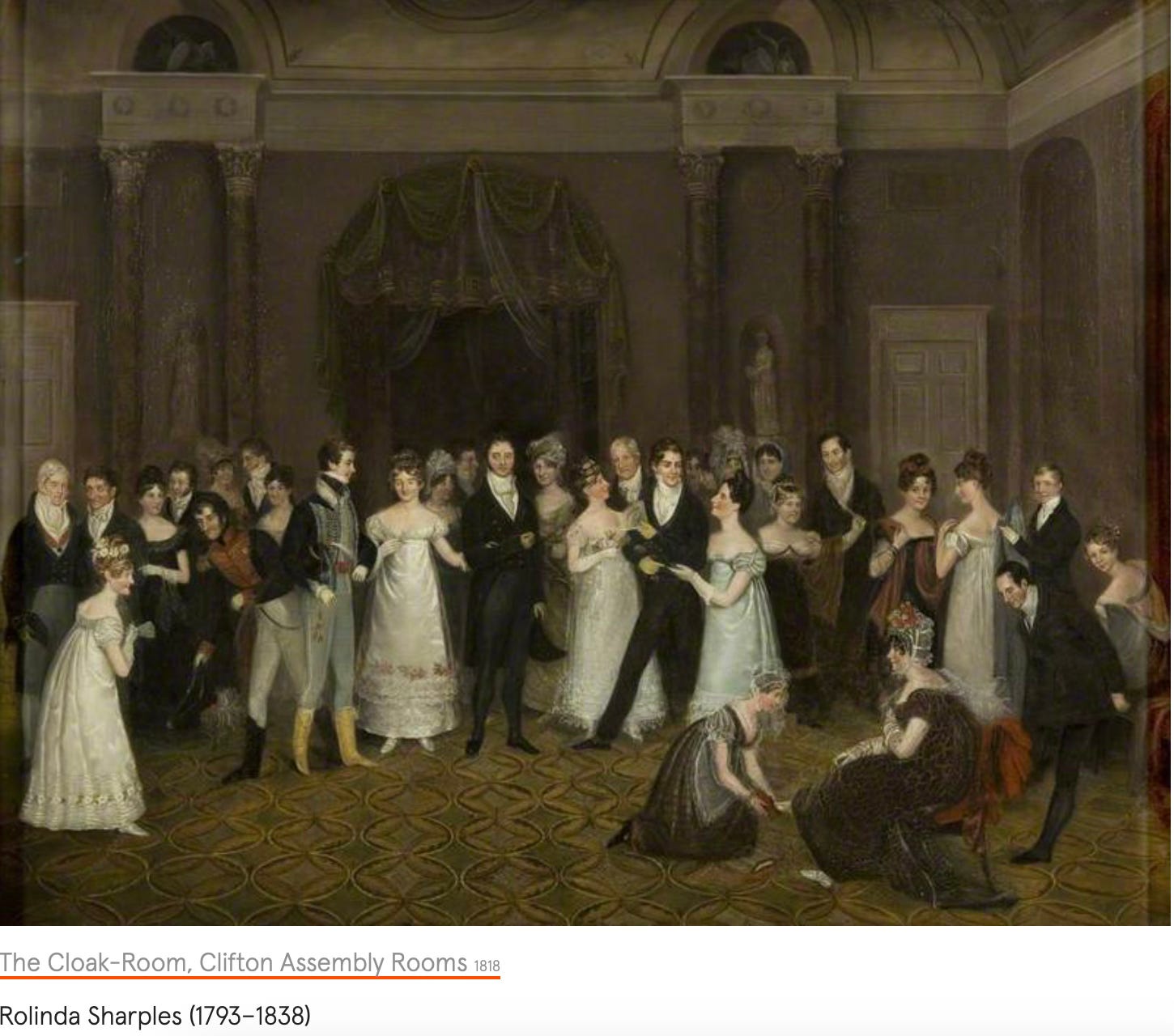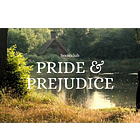"little elegant compliments"
Pride & Prejudice | Week 3: Volume 1, Chapters 10-16 | on entails, "pompous stile," and a bitter family feud...
Welcome to the Closely Reading book club: a space where we closely read classic literature together and discuss assigned chapters each week.
Welcome to week 3 of our Pride & Prejudice read-a-long!
This week, we are reading chapters 10 through 16 (read all of chapter 16!) before moving onto our next assignment.
A reminder to all readers who are eager to dive into the comments and share this week: no spoilers!!!! We have many readers among us who don’t know the novel and are reading for the first time. Do not plot points we’ve yet to experience in the chapters we’ve read so far!
If you have not completed our chapters for this week yet, I encourage you to do so before reading today’s guide.
Want to take notes as you read? Open your free writing prompts or look back at your annotations for the last few chapters to get into note-taking mode.
Not ready to subscribe? You can leave me a tip, instead!
In chronological order, here are some highlights from this week’s reading (with new characters in bold):
Caroline gushes about Darcy’s younger sister as Mr. Darcy pens her a letter.
Darcy believes, were it not for Elizabeth’s lower social standing, he’d be in “danger” of how fond of her he has become.
Caroline convinces Elizabeth to “take a turn about the room” with her, resulting in Elizabeth’s chance to make out more of Darcy’s character.
We learn that Darcy has very strong boundaries (and perhaps holds a mighty grudge): “My good opinion once lost is lost forever.”
A letter from Mr. Collins introduces our latest character: the man to whom the Bennet’s estate will pass upon Mr. Bennet’s death. This is the result of an “entail,” or a property agreement that is essentially designed to keep women from owning property—or even having a right to inherit it.
Mr. Collins arrives for a visit with the Bennet family, where he eventually admits he has come to find a wife. (I’m so excited for the comments this week!)
Mrs. Phillips,1 the Bennet girls’ aunt, hosts a large party for an evening of cards, including the adored Mr. Wickham, a military officer whose handsome face and easy charm have Lizzy (and Lydia, Kitty, and even their aunt!) quite intrigued.
During cards, Wickham tells Lizzy how he knows Mr. Darcy—and relates a harrowing tale of jealousy, family politics, and the dangers of pride.
Wickham also reveals that Lady Catherine and her chronically ill daughter are related to Mr. Darcy (Lady Catherine is his aunt) and that Darcy is furthermore set to marry his cousin (not all that uncommon, back then, unfortunately) and to inherit Rosings—yes, this would be a significant consolidation of family power and money.
Lizzy laps up the gossip from Wickham and seems more enchanted by him by the end of the evening as they all head back home.
There is so much more that happens in these chapters! Based on what themes you’re tracking, other moments may have stood out to you as keenly important to the story. I’m excited to hear about them in today’s comments.
Back in week 1, we explored the way the first sentence sets up the world of the story—and the economic realities of marriage and connections.
This week, we learn about the fate of the Bennet family that so motivates Mrs. Bennet to see her daughters successfully married off: an ensures the entirety of their property and belongings will pass to this distant relative, Mr. Collins, before it would ever pass to the girls. An entail is all about protecting the consolidation of land (and therefore, of power) by legally ensuring that land passes to a single (typically male) heir—and by furthermore requiring that land cannot be sold or partitioned off to smaller groups. It must pass to an heir.
Now, the gender of the heir was not the sole reason for the entail, though it is a nit-picky part of it. If there was no male heir—no far, distant cousin like Collins—each one of the Bennet girls would inherit an equal part of the estate. They would own their share with their future spouses. And this would dissolve the consolidated power of a single estate.
Can you see why these “single men in possession of a good fortune” are so eager to find a single girl to marry?
We have been reminded, in quite stark terms, of the economic realities of marriage in the Bennets’ world.
And in today’s chapters, we learn more and more about the vast gulfs between our core characters’ economic realities.
We have the Bennet family, ruled by the future that necessitates the marriage of the girls and, in the event they fail to marry, hopes for the benevolence of Mr. Collins.
We have Mr. Collins himself, a man of the church who relies on the benevolence of Lady Catherine for the success of his parish (and future family).
We have the Bingleys who are well established and financially secure—and seeking the right partners with whom to consolidate their financial power. (No wonder Caroline is hot for Darcy!)
We have Mr. Darcy who heads the Pemberly estate after the death of his father and stands to inherit Rosings (and further consolidate land ownings!) with his wealthy, sickly cousin.
And now, we have Mr. Wickham, an impoverished soldier who blames his destitution on failed graces from Mr. Darcy. Wickham tells Lizzy he was wholly reliant upon the benevolence of his rich benefactor—Darcy’s kind reading of his father’s will—to establish his financial security. (That didn’t happen…)
See a pattern here?
In this world where a single man with a good fortune looks for a wife, there are a lot of other people—in the realm of these single men—who rely on the benevolence, grace, and kindness of the wealthy in order to survive.
And everything they do—at balls, at dinner parties, in order to secure proposals and future security—seems to dance around the fact of their social connections to one another.
Now, it’s your turn.
Your exercise(s) this week are about pushing yourself to read more deeply. You can do all of them, some of them, one of them, none of them.
Here are your options.
Set a 12-minute timer and write (preferably by hand, on paper) for the entire twelve minutes using the prompt below. It may seem overly simple, and that’s kinda the point. The goal here is to flex your memory muscles, as well as practice the art of summary. In my humble opinion, this is a tragically undervalued art. As you write, try to avoid adding analysis and focus on a “pure” summary of the events of the novel, thus far. Notice the places you want to add judgement (or employ adverbs or adjectives to define and describe the events in a certain way). Remember and notice.
What has happened in the novel, so far?
Review the themes or ideas you’ve been tracking so far in your reading. Are there any you’d like to add? Any you want to remove or de-emphasize as you move forward? Consider, if you’d like to take your reading even deeper (perhaps especially if you’ve read the novel before), unexpected themes or patterns in the novel. For example: I read the theme of “technological advancements” during my last re-read of The Age of Innocence. I’ve read The Great Gatsby through the lens of advertising culture. Consider an unexpected angle or strange detail you’ve noticed in the novel, and see if it connects out to anything else you’ve noticed. (Mind maps are a good tool for this type of brainstorming!)
Try another free write—and maybe use this one as a way to get back into the text with post-it notes or flags. Who is your favorite character so far? Why? What do you like about them? Be very descriptive. How does the narrator feel about them? (How can you tell?) Flag the pages or add a post-it note to your novel (maybe all in the same color?) to easily mark for yourself where your fave character appears.
Every week, I share my favorite sentence. And I invite you to do the same in the comments.
“You are safe from me.”
At the end of chapter 11, Elizabeth tells Darcy he is safe from her judgement after revealing that he is unable to forgive those who have wronged or harmed him. It’s a sweet and funny line at the end of some truly fantastic banter (When Harry Met Sally owes much to this novel, doesn’t it?)
But I love it for a deeper reason, too. One I found by closely reading.
I love this line’s choice of word: “safe.” Because there are loads of allusions to “danger” when it comes to Darcy’s growing interest in Lizzy. He certainly does not feel “safe” from her. He is in the terrible danger of being attracted to, even “bewitched by,” this sarcastic, teasing girl from a family with a meddling mother who constantly embarrasses herself:
“Darcy had never been so bewitched by any woman as he was by her. He really believed, that were it not for the interiority of her connections, he should be in some danger.”
The last line of chapter 11 doubles down on this tension between safety and danger: “He began to feel the danger of paying Elizabeth too much attention,”
So, what I really love about this seemingly innocuous line from Lizzy is the way it fits so seamlessly into Darcy’s running, internal, and wholly private monologue that he’s in some kind of danger when it comes to Lizzy Bennet. and that, despite this danger he feels, he still can’t keep his eyes off of her.
And that would be quite romantic…if it weren’t for what we learned from Wickham this week. Darcy may be in a different kind of danger with Lizzy now.
There are no questions this week. Want to submit one for next time? Here is the form.
Next week, we complete Volume 1 of the novel! This is flying by, even though we’re taking it slow, isn’t it?
Remind yourself to slow down and savor the experience as you go. I’ll post next week’s guide early next week, so you can reference it whenever you’re ready.
The full schedule is available here:
A note on subscriptions & support
I deeply appreciate your support for the time, energy, and thinking I put into each installment of this series. You can become an annual subscriber, or you can pay for each month (and cancel any time).
If you enjoyed today’s guide, you can make a one-time contribution.
If you’re a student (including grad student) with a tight budget,
please reach out to me for a special offer.
Meet me in the comments
Here are a few questions to help you get started.
What was your favorite part?
What was your favorite quote?
‘Til next time…happy reading!
Her name has been updated. The first email send of this newsletter incorrectly named her “Mrs. Hurst,” who is an entirely different character in the novel. Whoops!















A couple thing to note about the Bingleys, particularly Caroline. We saw in Chapter 4 that Caroline’s future, in the absence of a husband, is to live with her brother and take care of his house. In addition, while the Bingleys are wealth and respectable, they are from the north of England (strike one) and made their money in trade (strike two). In other words, the Bingleys are nouveau riche and not part of the landed gentry. Mr Darcy therefore would be not just a husband for Carolina but also a step up socially into the landed gentry. No wonder her claws are out for Lizzie.
Tangentially, in reading this book several times, I have always wondered about Darcy’s backstory. Yes, he’s wealthy and owns a large estate, but he doesn’t seem to be part of the aristocracy (he is not Lord Darcy). His aunt however is Lady Catherine. And how did Darcy and Bingley become friends? They don’t seem a likely match. Any way, to me Darcy is always the man of mystery
I don’t have much to add to the conversation, but I just wanted to say that I’m thoroughly enjoying this novel. In the past, I’ve tried to read classics too quickly and often found myself lost, feeling like I wasn’t truly understanding what I was reading. This time, however, I’m discovering the immense benefits of slow reading. It’s much easier to comprehend because I’m not afraid to go back and reread a passage if I feel like I didn’t fully grasp it. I also find myself looking forward to each week’s reading, eager to continue experiencing the story at a more thoughtful pace.